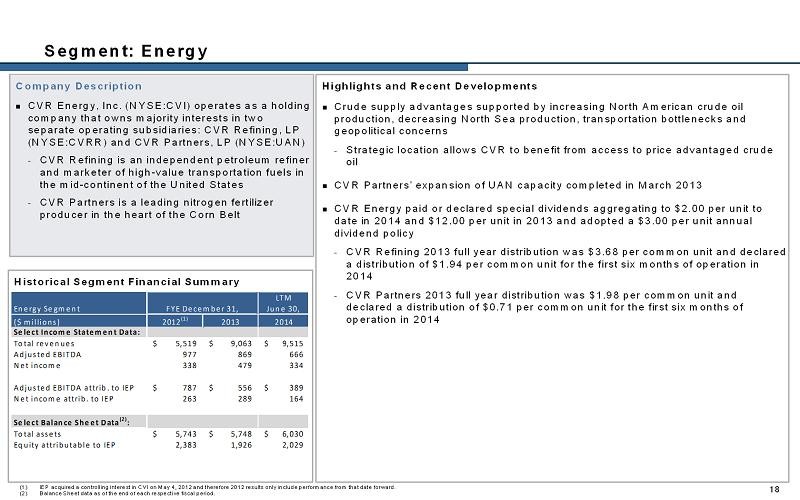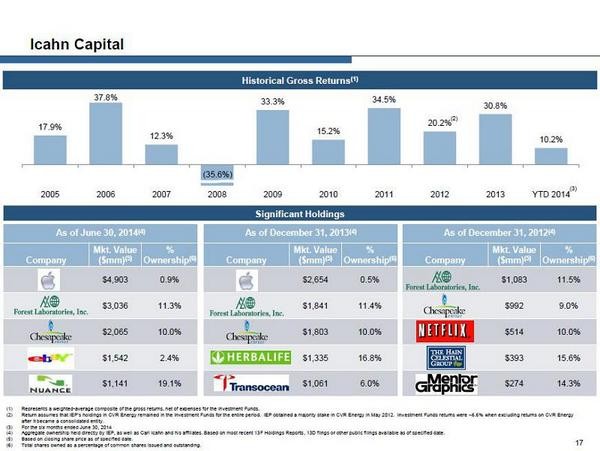Carl Icahn Presentation On Activism
Post on: 20 Апрель, 2015 No Comment

Carl Icahn presentation on activism and of course some self promotion for his Icahn Enterprises LP (NASDAQ:IEP )
Icahn Enterprises L.P. Investor Presentation August 2014
Investment Highlights IEP stock performance has meaningfully outpaced all its peers 3 (1) April 1, 2009 is the approximate beginning of the economic recovery. Source: Bloomberg. Includes reinvestment of distributions. Based on the share price as of July 31, 2014. Time Period IEP Berkshire Leucadia Loews S&P 500 Dow Jones Russell 2000 3 Years ended July 31, 2014 164% 69% -22% 8% 59% 47% 47% 5 Years ended July 31, 2014 215% 94% 8% 45% 117% 106% 115% 7 Years ended July 31, 2014 37% 71% -29% -7% 55% 52% 59% April 1, 2009(1) through July 31, 2014 382% 117% 78% 97% 171% 151% 184% January 1, 2000 through July 31, 2014 1622% 235% 264% 372% 73% 104% 168% April 1, 2009(1) through July 31, 2014 34.3% 15.6% 11.5% 13.6% 20.5% 18.8% 21.6% January 1, 2000 through July 31, 2014 21.5% 8.7% 9.3% 11.2% 3.8% 5.0% 7.0% Gross Return on Investment in Stock Annualized Return
Investment Highlights 4 Mr. Icahn believes there has never a better time for activist investing, if practiced properly, than today. – Several factors are responsible for this: 1) low interest rates, which make acquisitions much less costly and therefore much more attractive, 2) abundance of cash rich companies that would benefit from making synergistic acquisitions, and 3) the current awareness by many institutional investors that the prevalence of mediocre top management and non-caring boards at many of Americas companies must be dealt with if we are ever going to end high unemployment and be able to compete in world markets – But an activist catalyst is often needed to make an acquisition happen – We, at IEP, have spent years engaging in the activist model and believe it is the catalyst needed to drive highly accretive M&A and consolidation activity – As a corollary, low interest rates will greatly increase the ability of the companies IEP controls to make judicious, friendly or not so friendly, acquisitions using our activist expertise Proven track record of delivering superior returns IEP total stock return of 1,622% (1) since January 1, 2000 – S&P 500, Dow Jones Industrial and Russell 2000 indices returns of approximately 73%, 104% and 168% respectively over the same period Icahn Investment Funds performance since inception in November 2004 – Total return of approximately 293% (2) and compounded average annual return of approximately 15% (2) – Returns of 33.3%, 15.2%, 34.5%, 20.2% (3). 30.8% and 10.2% in 2009, 2010, 2011, 2012, 2013, and YTD 2014 (4) respectively Recent Financial Results – Adjusted Net Income attributable to Icahn Enterprises of $612 million (5) for the six months ended June 30, 2014 – Indicative Net Asset Value of approximately $10.2 billion as of June 30, 2014 – LTM June 30, 2014 adjusted EBITDA attributable to Icahn Enterprises of approximately $2.2 billion $6.00 annual distribution (5.8% yield as of July 31, 2014) (1) Source: Bloomberg. Includes reinvestment of distributions. Based on the share price as of July 31, 2014. (2) Returns calculated as of June 30, 2014. (3) Return assumes that IEP’s holdings in CVR Energy remained in the Investment Funds for the entire period. IEP obtained a majority stake in CVR Energy in May 2012. Investment Funds returns were approximately 6.6% when excluding returns on CVR Energy after it became a consolidated entity. (4) For the six months ended June 30, 2014 (5) See slide 41 for the adjusted net income calculation

The Icahn Strategy Across all of our businesses, our success is based on a simple formula: we seek to find undervalued companies in the Graham &Dodd tradition, a methodology for valuing stocks that primarily looks for deeply depressed prices. However, while the typical Graham & Dodd value investor purchases undervalued securities and waits for results, we often become actively involved in the companies we target. That activity may involve a broad range of approaches, from influencing the management of a target to take steps to improve shareholder value, to acquiring a controlling interest or outright ownership of the target company in order to implement changes that we believe are required to improve its business, and then operating and expanding that business. This activism has brought aboutvery strong returns over the years. Today, we are a diversified holding company owning subsidiaries engaged in the following operating businesses: Investment, Automotive, Energy, Metals, Railcar, Gaming, Food Packaging, Real Estate and Home Fashion. Through our Investment segment, as of July 31, 2014, we have significant positions in various investments, which include Apple Inc. (AAPL), eBay Inc. (EBAY), Chesapeake Energy (CHK), HerbalifeLtd. (HLF), Mentor Graphics Corporation (MENT), Netflix (NFLX), Transocean Ltd. (RIG), Nuance Communications, Inc. (NUAN), Talisman Energy Inc. (TLM), Hologic Inc. (HOLX) and Navistar International Corp. (NAV), Seventy Seven Energy Inc. (SSE). Several of our operating businesses started out as investment positions in debt or equity securities, held either directly byour Investment segment or Mr. Icahn. Those positions ultimately resulted in control or complete ownership of the target company. Most recently, we acquired a controlling interest in CVR Energy, Inc. (‘‘CVR’’) which started out as a position in our Investment segment and is now an operating subsidiary that comprises our Energy segment. As of July 31, 2014, based on the closing sale price of CVR stock and distributions since we acquired control, we had a gain of approximately $2.5 billion on our purchase of CVR. The recent acquisition of CVR, like our other operating subsidiaries, reflects our opportunistic approach to value creation, through which returns may be obtained by, among other things, promoting change through minority positions at targeted companies in our Investment segment or by acquiring control of those target companies that we believe we could run more profitably ourselves. In 2000, we began to expand our business beyond our traditional real estate activities, and to fully embrace our activist strategy. On January 1, 2000, the closing sale price of our depositary units was $7.625 per depositary unit. On July 31, 2014, our depositary units closed at $103.95 per depositary unit, representing an increase of approximately 1,622% since January 1, 2000 (including reinvestment of distributions into additional depositary units and taking into account in-kind distributions of depositary units). Comparatively, the S&P 500, Dow Jones Industrial and Russell 2000 indices increased approximately 73%, 104% and 168%, respectively, over the same period (including reinvestment of distributions into those indices). During the next several years, we see a favorable opportunity to follow an activist strategy that centers on the purchase of target stock and the subsequent removal of any barriers that might interfere with a friendly purchase offer from a strong buyer. Alternatively, in appropriate circumstances, we or our subsidiaries may become the buyer of target companies, adding them to our portfolio of operating subsidiaries, thereby expanding our operations through suchopportunistic acquisitions. We believe that the companies that we target for our activist activities are undervalued for many reasons, often including inept management. Unfortunately for the individual investor, in particular, and the economy, in general, many poor management teams are often unaccountable and very difficult to remove. 5
The Icahn Strategy (continued) Unlike the individual investor, we have the wherewithal to purchase companies that we feel we can operate more effectively than incumbent management. In addition, through our Investment segment, we are in a position to pursue our activist strategy by purchasing stock or debt positions and trying to promulgate change through a variety of activist approaches, ranging from speaking and negotiating with the board and CEO to proxy fights, tender offers and taking control. We work diligently to enhance value for all shareholders and we believe that the best way to do this is to make underperforming management teams and boards accountable or to replace them. The Chairman of the Board of our general partner, Carl C. Icahn, has been an activist investor since 1980. Mr. Icahn believesthat he has never seen a time for activism that is better than today. Many major companies have substantial amounts of cash. We believe that they are hoarding cash, rather than spending it, because they do not believe investments in their business will translate to earnings. We believe that one of the best ways for many cash-rich companies to achieve increased earnings is to use their large amounts ofexcess cash, together with advantageous borrowing opportunities, to purchase other companies in their industries and take advantage of the meaningful synergies that could result. In our opinion, the CEOs and Boards of Directors of undervalued companies that would be acquisition targets are the major road blocks to thislogical use of assets to increase value, because we believe those CEOs and boards are not willing to give up their power and perquisites, even if they have done a poor job in administering the companies they have been running. In addition, acquirers are often unwilling to undertake the arduous task of launching a














